Table of Contents
Including warm water baths in your daily pregnancy routine is a very good idea to get some relief from some of the not-so-glamorous aspects of your pregnancy – pregnancy aches, swelling, stress, and tension.
But, soaking yourself in a warm bath during pregnancy may not be that safe. Know why? Don’t forget to take these precautions while taking a bath in warm water.
Take Care of the Temperature of the Water
Thanks to the soaring pregnancy hormones the temperature of a pregnant body should be around 99°F (37.2°C) — or about 0.4 to 0.8 Fahrenheit degrees.
- According to a 2019 study while bathing in warm water during your pregnancy; ideally up to 104°F (40°C) should be considered safe. But, before taking a bath, you need to measure the temperature of the water with a bath thermometer or monitor the temperature with a child’s bathtub toy thermometer and take a tepid bath for 10 or 20 minutes.
- Check the temperature of the water heater before you take taking bath. If the temperature is higher than the expected level, readjust the temperature and try to keep it lower.
- Plus, feeling dizzy, or nauseous may be a common symptom during pregnancy. So, while bathing in warm water if you somehow feel overheated, immediately take a cool shower. Signs of overheating are associated with red skin, feeling hot, or sweating.
- Apart from that, soaking yourself in a hot tub or sauna is a big “No”, especially during the early stage of your pregnancy.
- Studies have shown that hot water can result in premature contraction, ultimately giving rise to preterm labour as well as early delivery of the baby.
- Experts from the American College of Obstetricians and Gynecologists have also evidenced that experiencing in hot tubs, or saunas can result in birth defects in babies.
Add Epsom Salt in the Bathtub
Take two cups of Epsom salt, put them in a tub of warm water, and let it soak for not more than 10 to 15 minutes, before you take the warm water bath during pregnancy. Since muscle aches, headaches, and joint pain are common while you’re carrying your baby inside you, taking an Epsom salt bath can deal with them.
How ‘bout Soaking Your Feet in Warm Water
With the progression of your pregnancy, you’ll develop a mummy tummy, thus shifting your center of gravity and making your leg and feet ache. So, maybe instead of taking a full body bath, soaking your legs and feet in warm water can ease the pain.
Overall, taking a warm bath during pregnancy is a natural and effective way to soothe pregnancy discomforts, and it is a “me” time, where you will get time to relax and unwind yourself. However, you’d have to stay away from warm baths if your water has broken and you enter the stage of labour. When the water breaks, the amniotic sac keeps the unborn baby safe inside from the world outside ruptures and makes the area more prone to bacterial and viral infections.
However, did you know that, just like you’ve enjoyed the benefits of a sitz bath during your bittersweet pregnancy days; you can take a postpartum sitz bath too and enjoy the benefits of it.
So, what are the benefits of a postpartum sitz bath, and how to take a postpartum hot water bath?
Benefits of Postpartum Warm Bath
“Sitz” is derived from the German word “sitzen,” which means “to sit.” A sitz bath is also known as a warm water hip bath. After all, after the delivery of your baby, experience perineal tears as well as perineal pain. Haemorrhoids, anal fissures, and surgical pain are also common after the delivery of your baby. The water, during a sitzbath, covers your whole hip and helps you to deal with the above-mentioned several postpartum complications.
A Warm Sitz Can Keep the Area Clean
Since you’ll be bleeding continuously for 4 to 6 weeks, and you must have stitches, you’d have to give the area some time to heal, and you must keep the area clean and hygienic. A gentle warm sitz bath can help.
Heals the Perineum
Once you’ve delivered your baby, the tears and stitches will make the perineum and vulva tender, sore, swollen, and pained. Hot and cold sitz baths will be effective in soothing the area, and skin as well as reduce the pain gradually.
Heals Anal Fissures
During pregnancy, constipation is a common symptom, as the digestive system slows down. The digestive system’s slow functioning has resulted from diet and the growing baby that has accommodated the entire uterus. However, sometimes you’ll feel constipated after the delivery of the baby. Due to the straining of the rectum and anus, the skin tears. Such tears give rise to painful anal fissures. And, getting a postpartum hot water bath would help relieve the pain.
So, take a postpartum sitz bath, by purchasing a sitz bathtub. Use warm water and fill it up. Sit on it for at least 10 minutes, but stand up slowly, as there are chances for you to faint. Just like your pregnancy days, add Epsom salt during your post-pregnancy days too. Try not to rub the vaginal area as it might hurt your skin of the area. Once you’ve finished bathing, ensure that you can completely dry yourself, as well as take measures around the wound and make sure there is no moisture to cause infection in the area.
